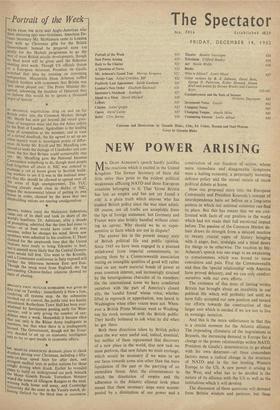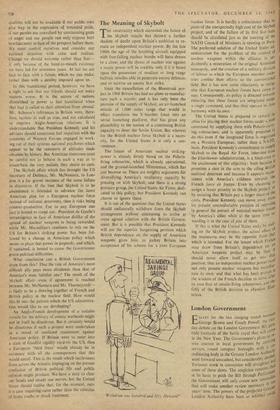NEW POWER ARISING
MR. DEAN ACHESON'S speech hardly justifies the reactions which it excited in the United Kingdom. The former Secretary of State did
little more than point to the evident political weaknesses afflicting NATO and those European countries belonging to it. That 'Great Britain has lost an empire and has not yet found a role' is a plain truth which anyone who has
studied British policy since the war must admit. Of course, not all truths are acceptable from the lips of foreign statesmen; but Germany and France were also briskly handled without creat- ing an uproar. Why should we be so super- sensitive to facts which are not in dispute?
The answer lies in the present uneasy .state of British political life and public opinion. Since 1945 we have been engaged in a planned withdrawal from imperial commitments, re- placing them by a Commonwealth association resting on intangible qualities of good will rather than on any more material bonds of power or even common interest, and increasingly strained by the heterogeneous character of its members. On the international scene we have comforted ourselves with the part of America's closest ally, the 'candid friend' whose voice, whether lifted in reproach or approbation, was heard in Washington when other voices were not. When- ever a British Prime Minister went to Washing- ton his stock mounted with the British public. They hardly bothered to ask what he did when he got there.
Both these directions taken by British policy since the war were useful and, indeed, essential; but neither of them represented that discovery of a new place in the world, that new task we must perform, that new future we must envisage, which would be necessary if we were to set our faces towards some aim other than the mere liquidation of the past or the parrying of an immediate threat. Also, the circumstances in which the dissolution of empire and the adherence to the Atlantic alliance took place meant that these necessary steps were accom- panied by a diminution of our power and a
constriction of our freedom of action, whose more immediate and disagreeable symptoms were a halting economy, a perpetually wavering defence policy and the unreal nature of much political debate at home.
Now our proposed entry into the European Community and President Kennedy's concept of interdependence have set before us a long-term pattern in which our national existence can find its place. But this has meant that we are con- fronted with facts of our position in the world which had not made their full emotional impact before. The passion of the Common Market de- bate draws its strength from a delayed reaction to twenty crucial years of history bringing with it anger, fear, nostalgia and a blind desire for things to be otherwise. The reaction to Mr. Acheson's speech was one stage in an awakening to consciousness which was bound to cause convulsion and pain. First the Commonwealth and then the 'special relationship' with America have proved delusory, and we can only comfort ourselves with our own efforts.
The existence of this state of feeling within Britain has brought about an instability in our political life which will probably last until we have fully accepted our new position and turned our efforts towards the construction of that larger unit which is needed if we are not to live in nostalgic isolation.
And this is the more unfortunate in that this is a crucial moment for the Atlantic alliance. The impending climateric of the negotiations in Brussels, the increasing demand in Europe for a change in the power relationships within NATO, President de Gaulle's determination to go ahead with his own deterrent—all these concordant factors mean a radical change in the structure of NATO and in the ties binding Western Europe to the US. A new power is arising in the West, and what has to be decided is the nature of its alliance with the US as well as the institutions which it will develop.
The discussion of these questions will demand from Britain wisdom and patience, but these
qualities will not be available if our public men give way to the expression of wounded pride, if our parties are convulsed by unreasoning gusts of anger and our people can only express hurt bewilderment in face of the prospect before them. We must control ourselves and consider our national situation with calm and realism. Change we should welcome rather than fear— if only because of the hand-to-mouth existence we have led for seventeen years. At last we are face to face with a future, which we can make, rather than with a destiny imposed upon us.
In this transitional period, however, we have a right to ask that our friends should not make matters worse. It is the nature of nations diminished in power to feel humiliated when that fact is called to their attention from abroad.
Mr. Acheson's references to Britain were, there- fore, tactless as well as true, and not calculated to improve Anglo-American relations. It is understandable that President Kennedy and his advisers should sometimes feel impatient with the countries of Western Europe engaged in work- ing out of their systems national psychoses which appear to be the remnants of attitudes made obsolete by history. But American statesmen must be careful not to behave in such a way as to exacerbate the very malady they desire to cure.
Skybolt affair which has brought the US
Secretary of Defence, Mr. McNamara, to Lon- don is a far graver instance of the same failure in discretion. If the hint that Skybolt is to be abandoned is intended to advance the latest American plan for a European nuclear force instead of national deterrents, then it risks being counter-productive. For to any European one
.fact is bound to stand out: President de Gaulle's
intransigence in face of American dislike of the spread of nuclear weapons is being rewarded, while Mr. Macmillan's readiness to rely on the US for Britain's striking power has been fol- lowed by a change in American policy which seems to place that power in jeopardy, and which, if sustained, is bound to cause the Government grave political difficulties.
What conclusion can a British Government draw from this? That the role of America's most difficult ally pays more dividends than that of America's most faithful one? The result of the Skybolt affair—even if agreement is reached between Mr. McNamara and Mr. Thorneycroft- is likely to be a drawing together of French and British policy in the nuclear field. How would this fit into the pattern which the US administra- tion would like to see developing?
An Anglo-French development of a suitable missile for the delivery of atomic warheads might not in itself be disastrous. But it certainly would be disastrous if such a project were undertaken in a mood of confused resentment against American policy. If Britain were to enter into
a state of Gaullist rigidity vis-a-vis the US, then a European 'third force' would already be in existence with all the consequences that this would entail. This is the result which tactlessness from across the Atlantic impinging on the present confusion of British political life and public opinion might produce. We have a duty to clear our heads and steady our nerves, but the United States should realise that, for the moment, ours is a case requiring calm rather than the stimulus of home truths or shock treatment.



































 Previous page
Previous page